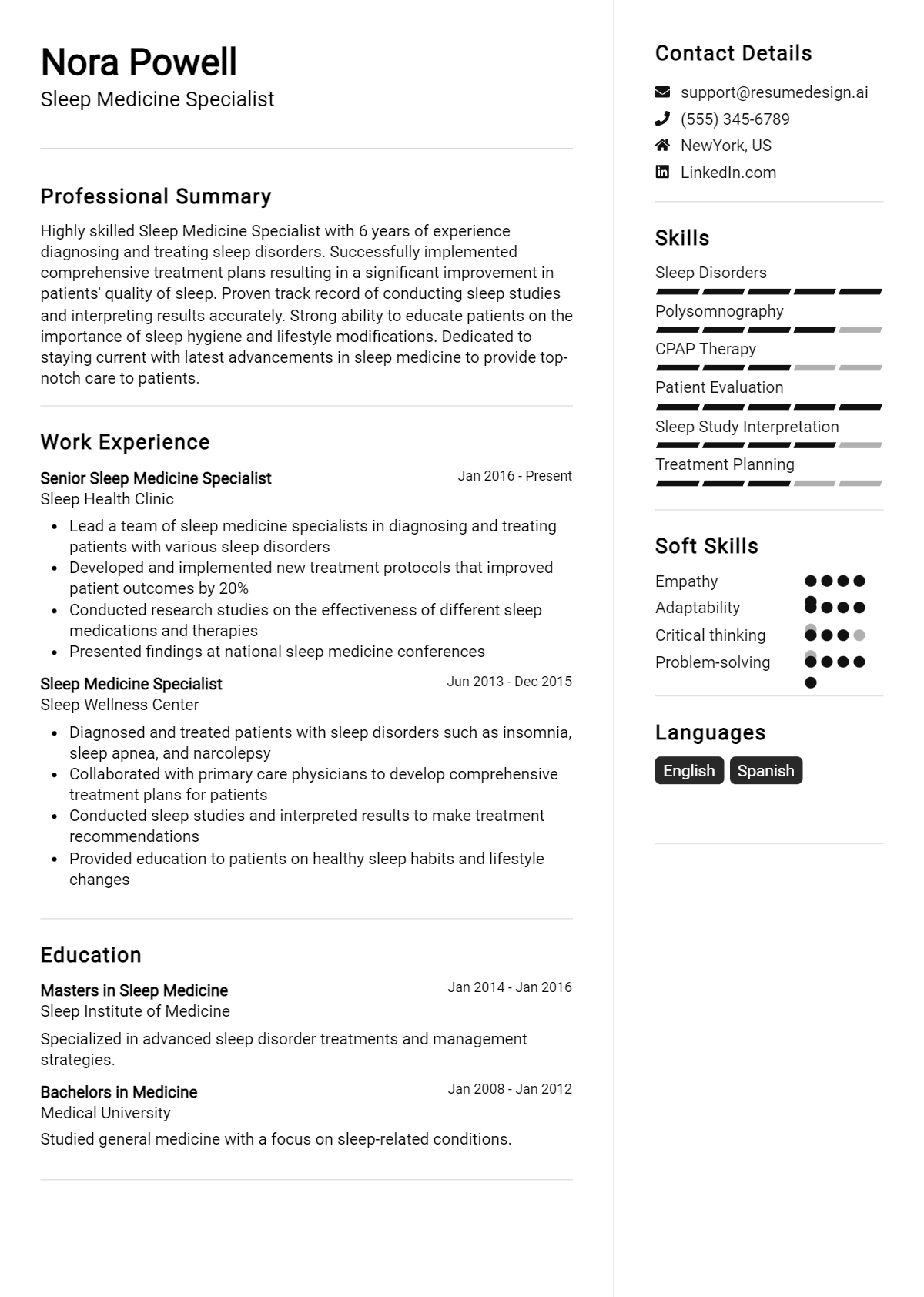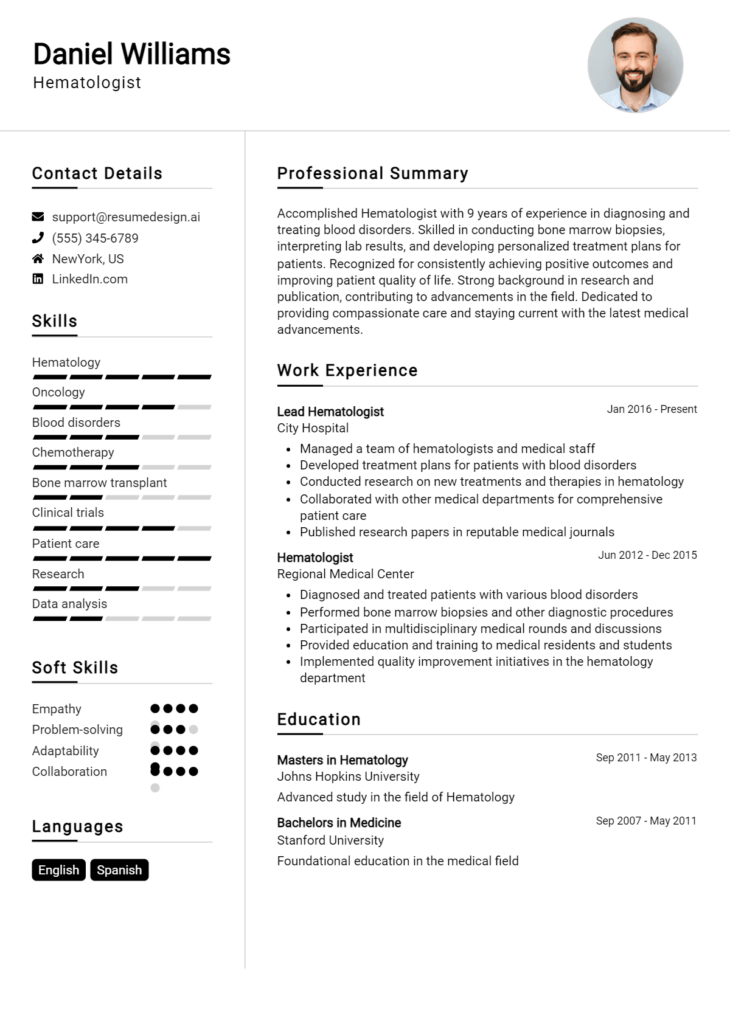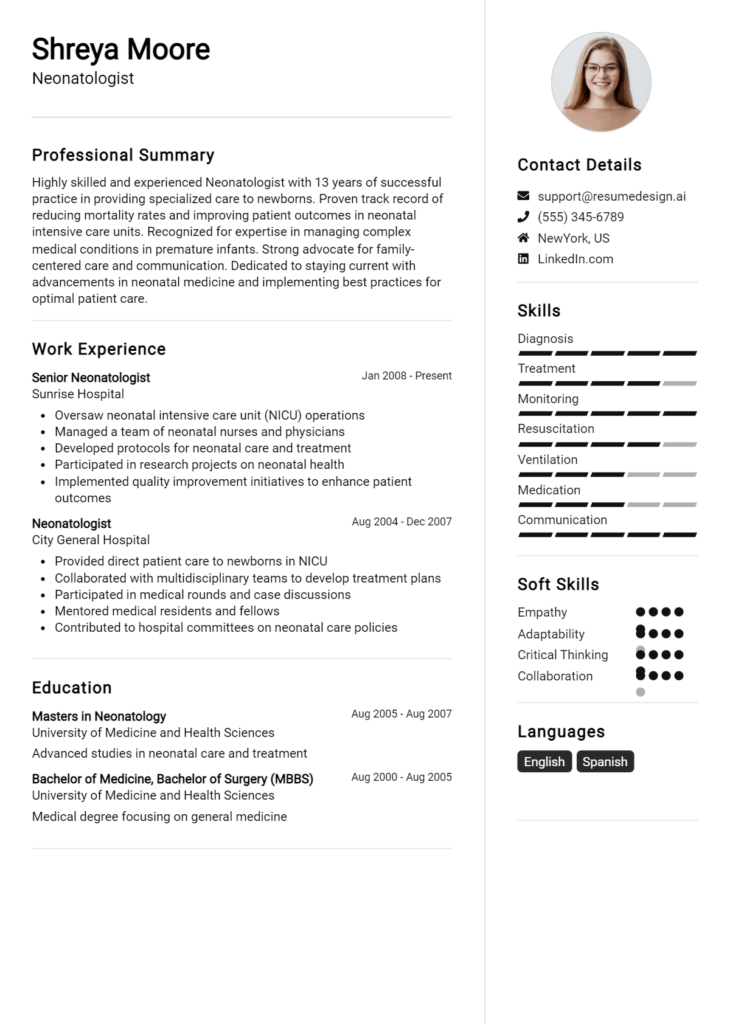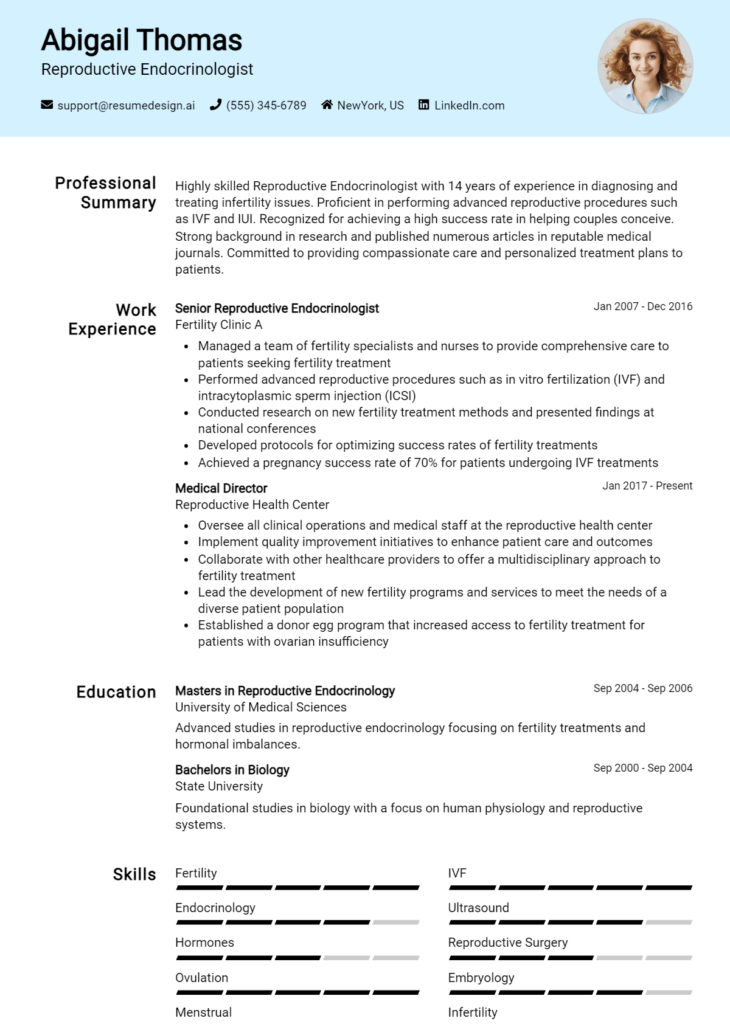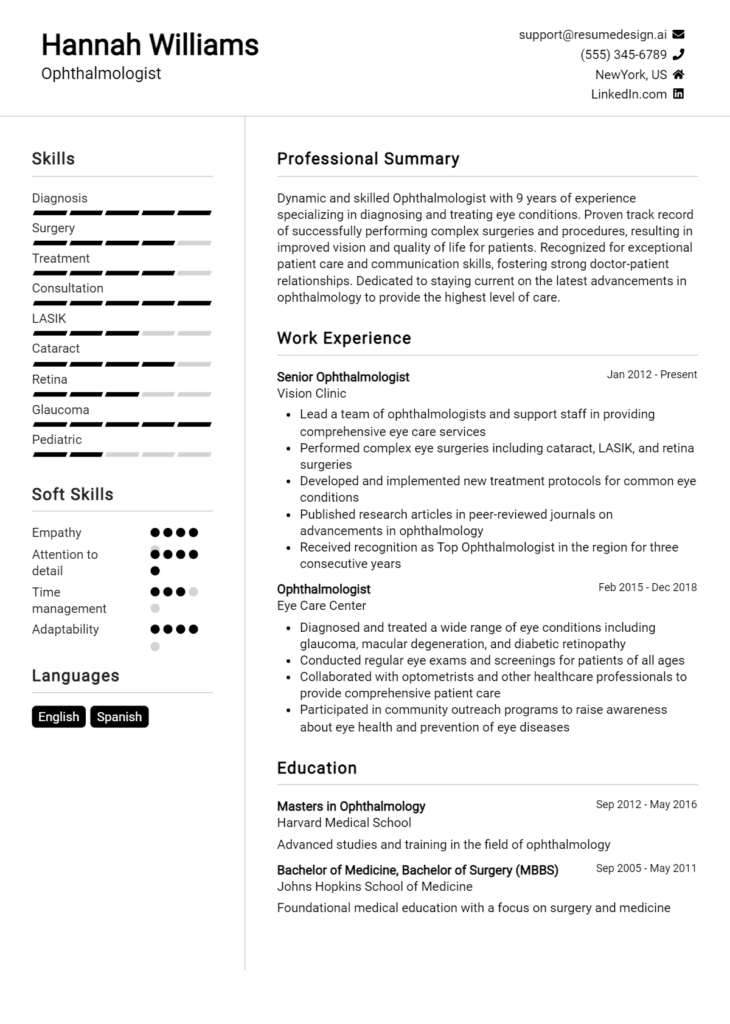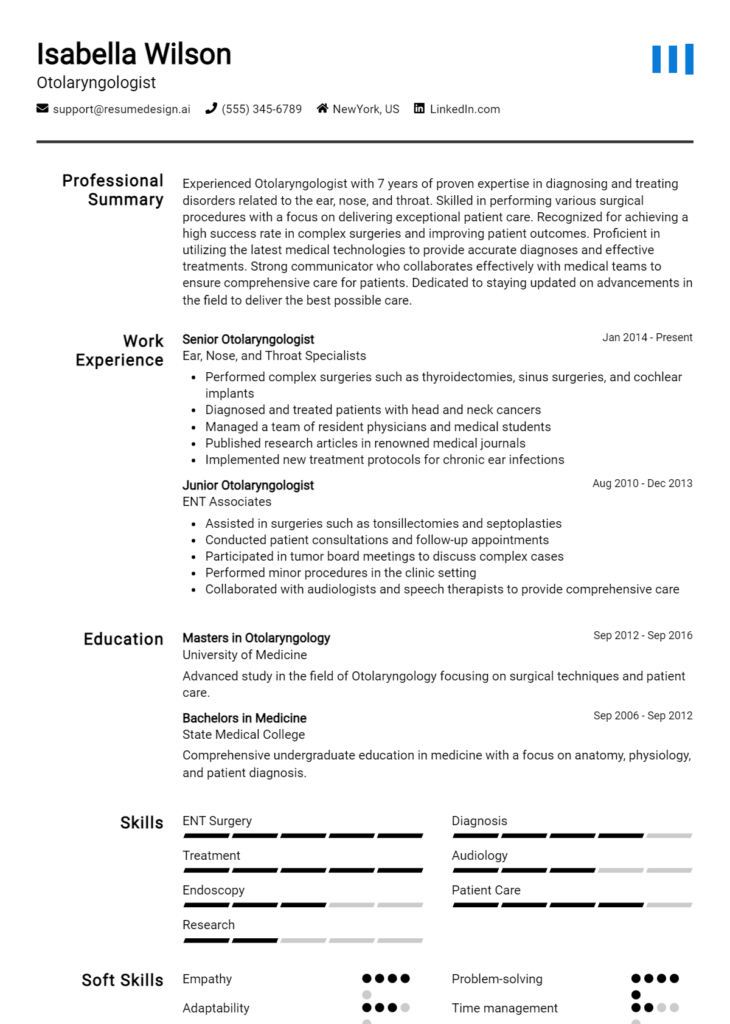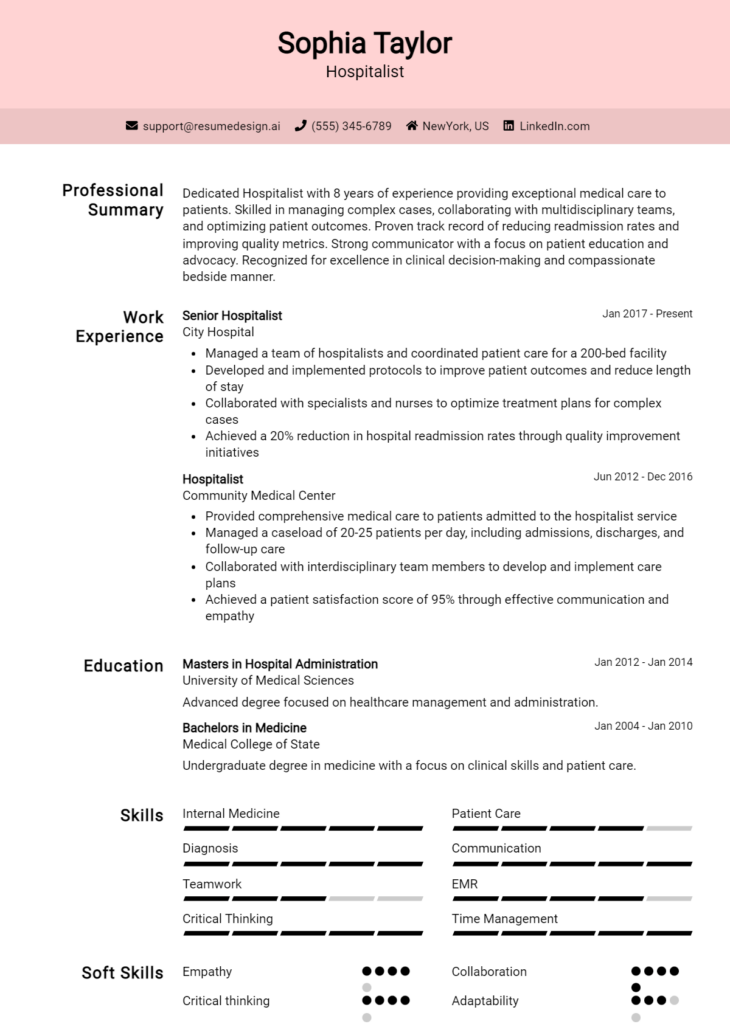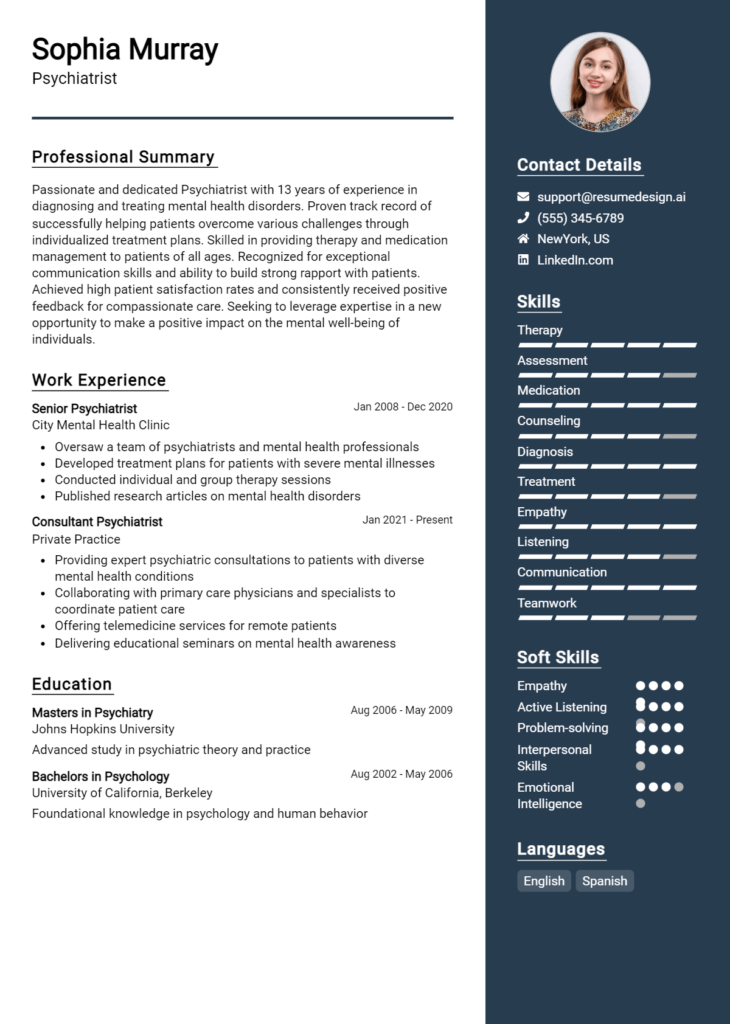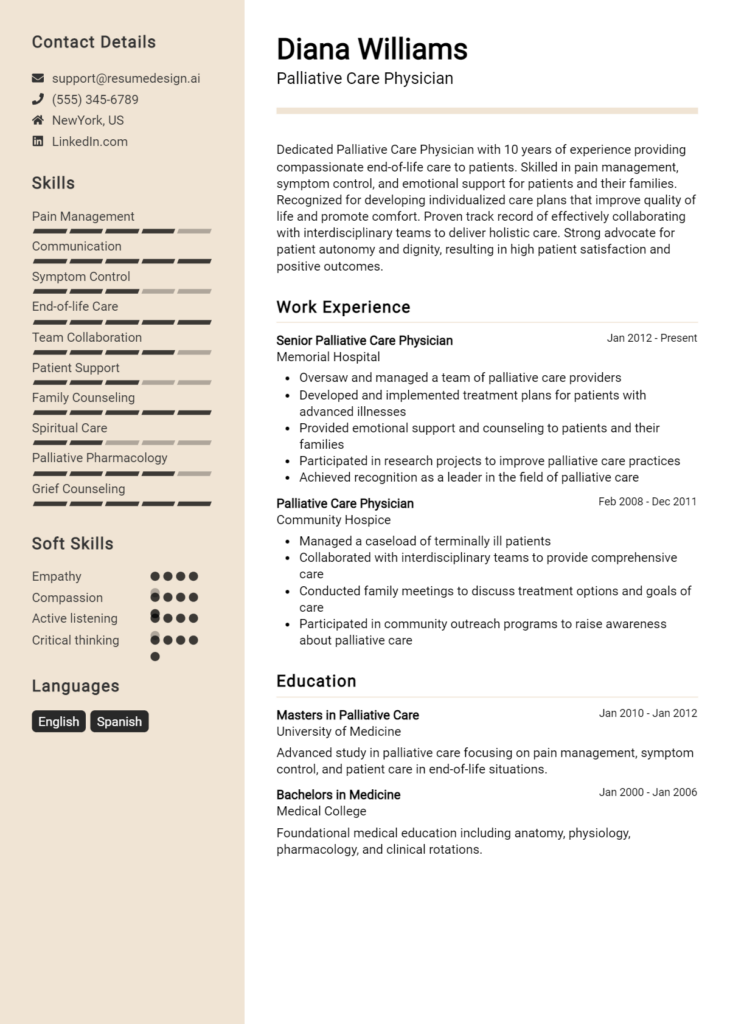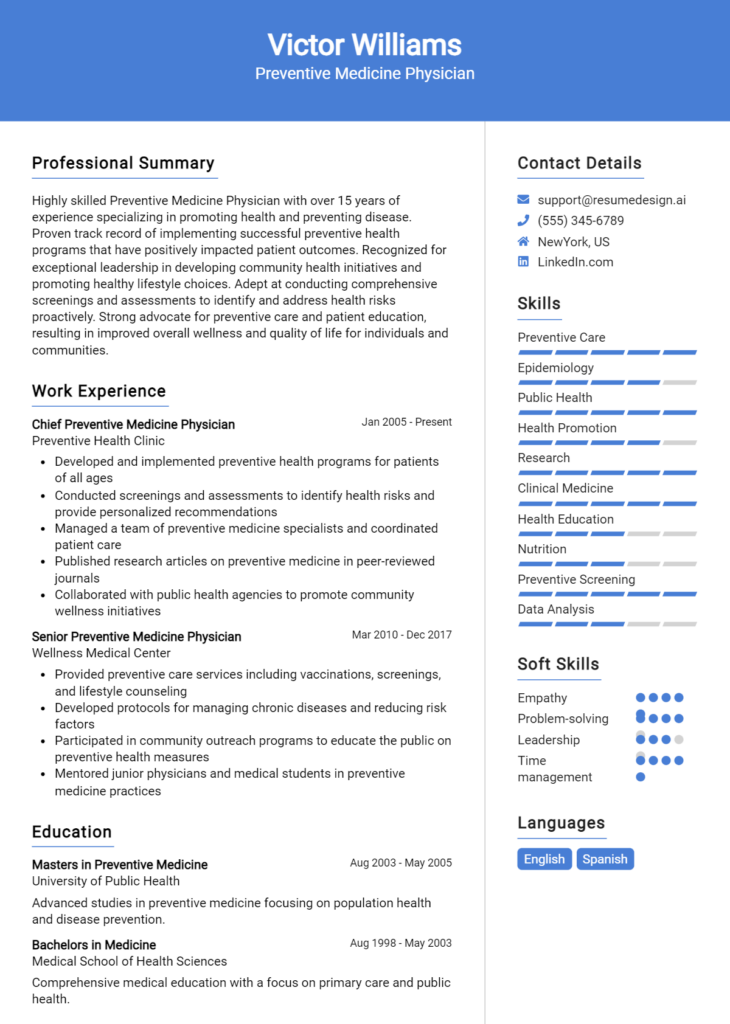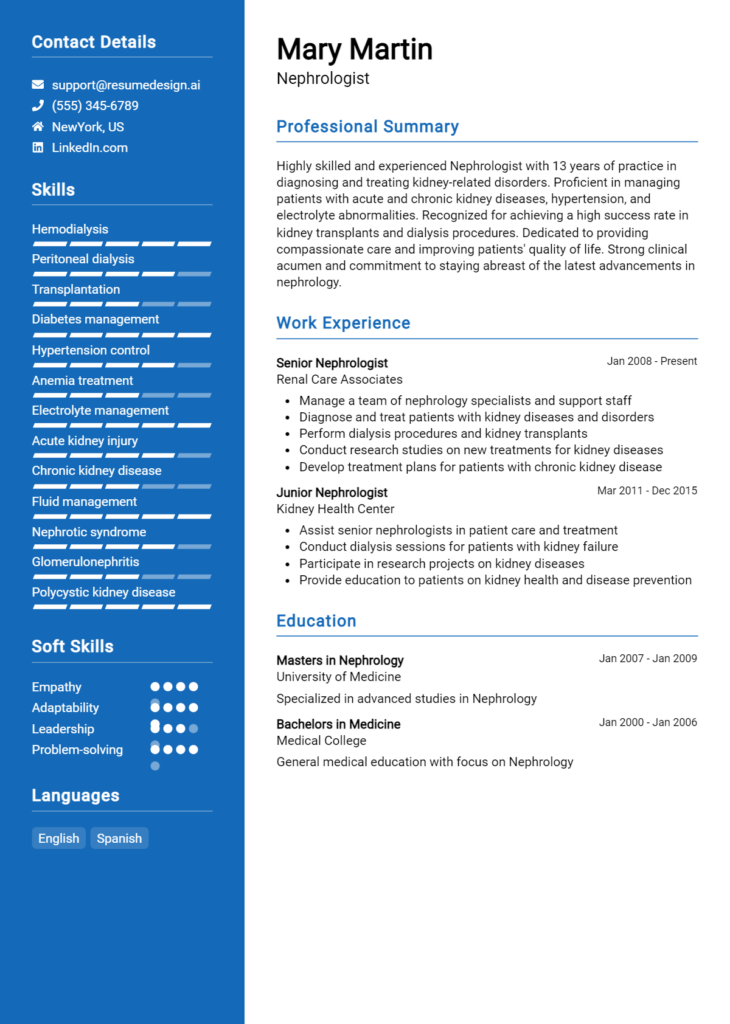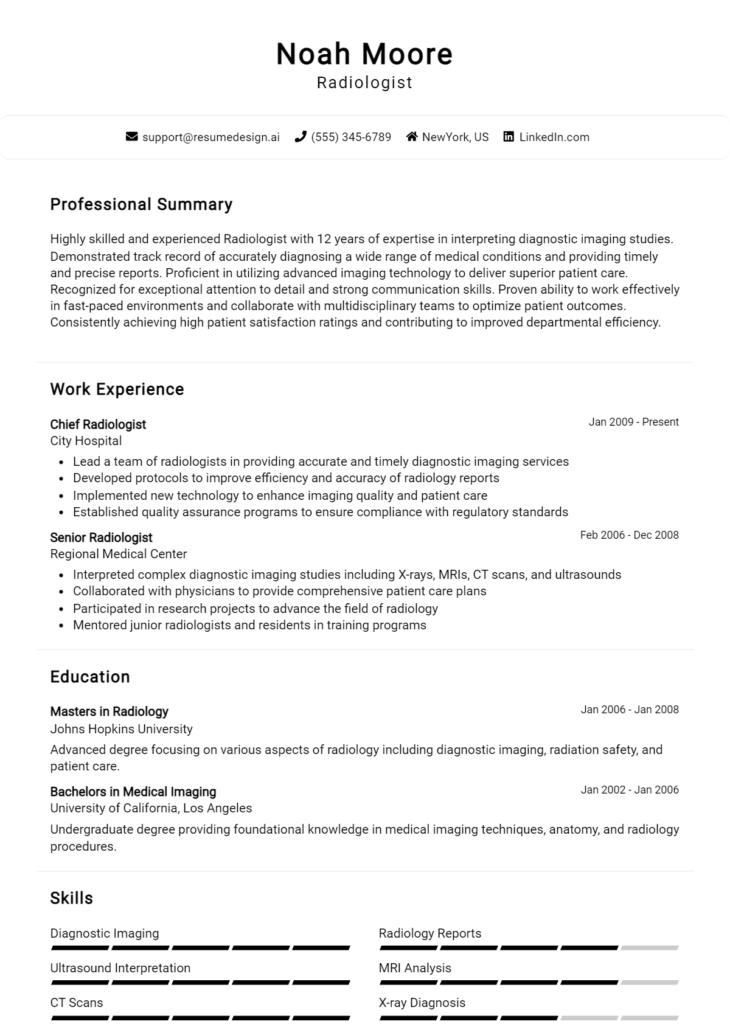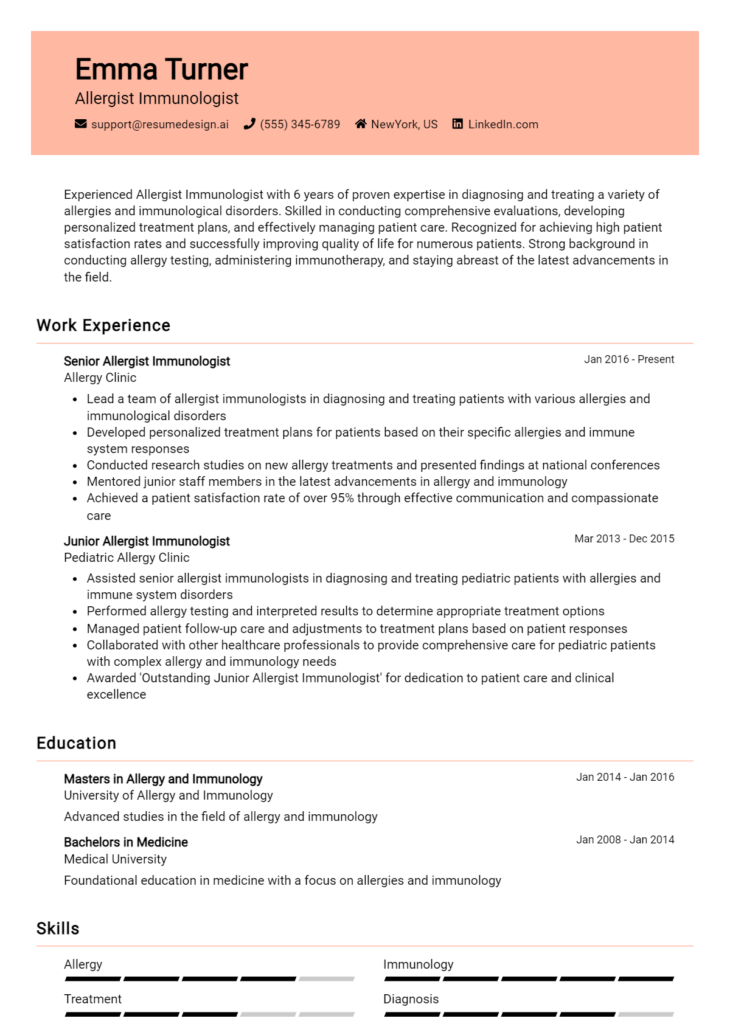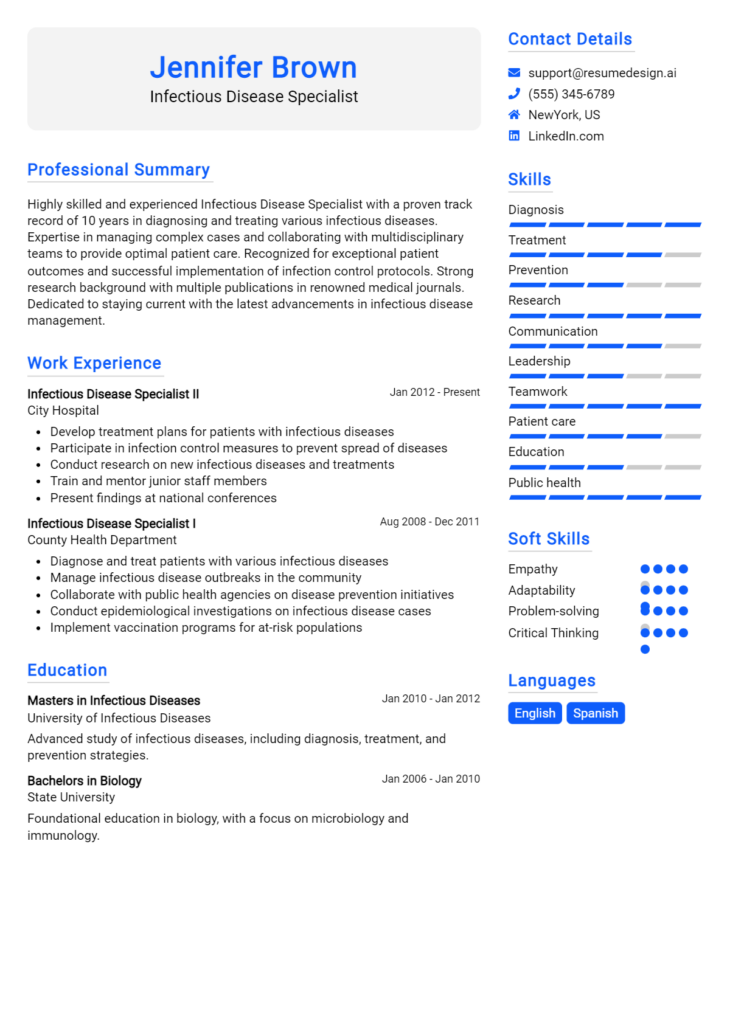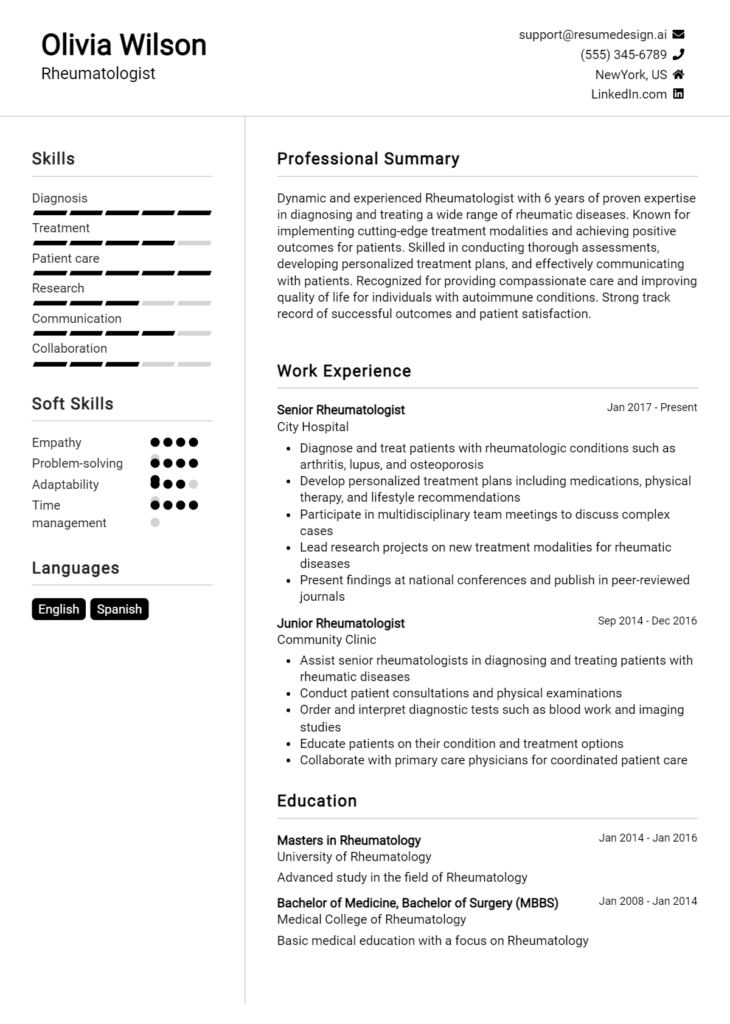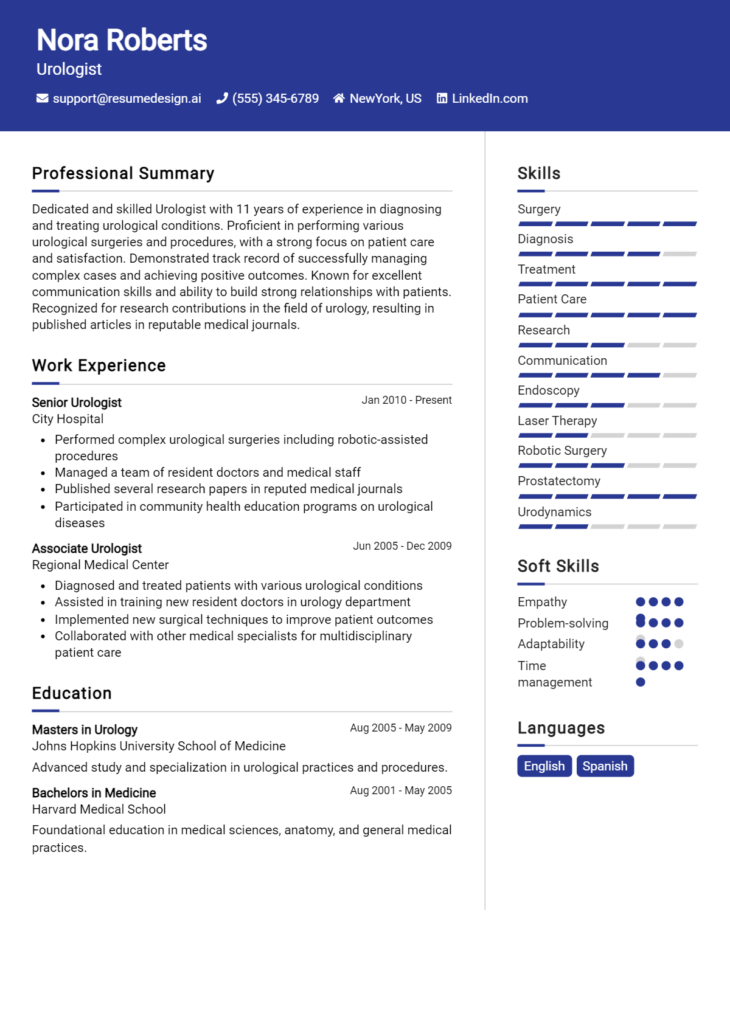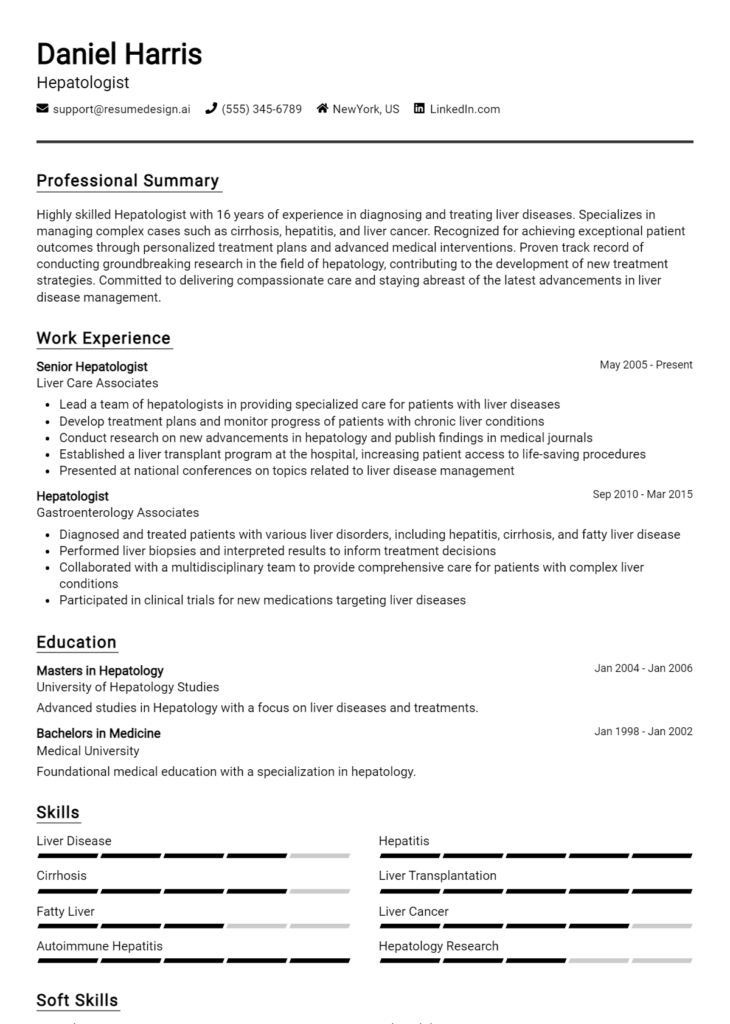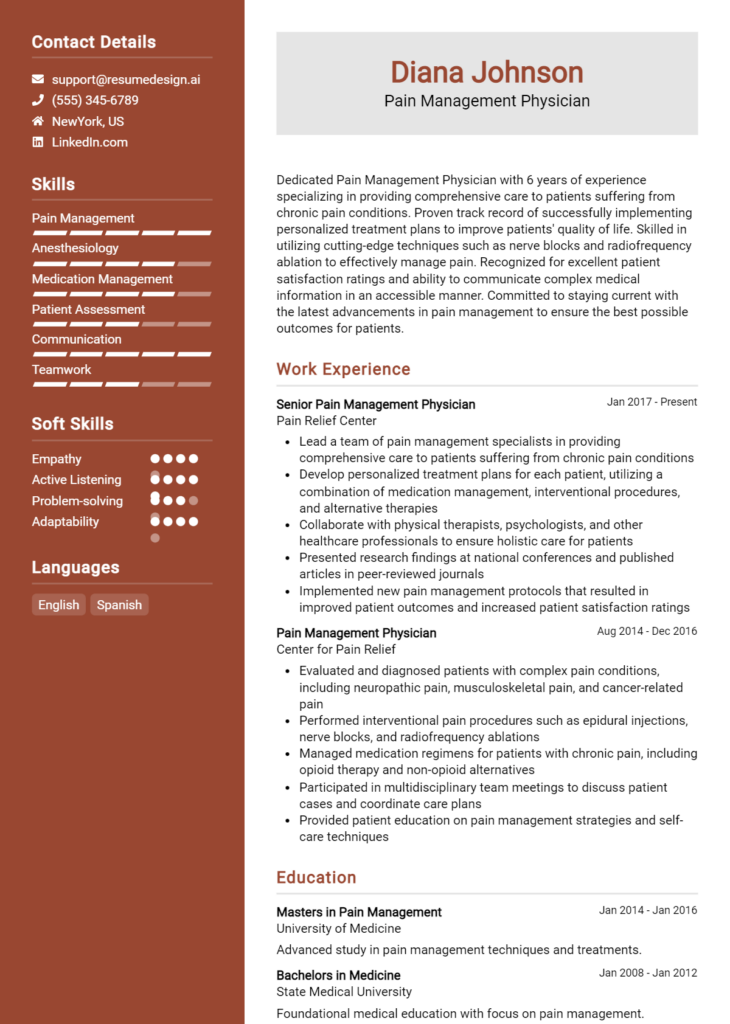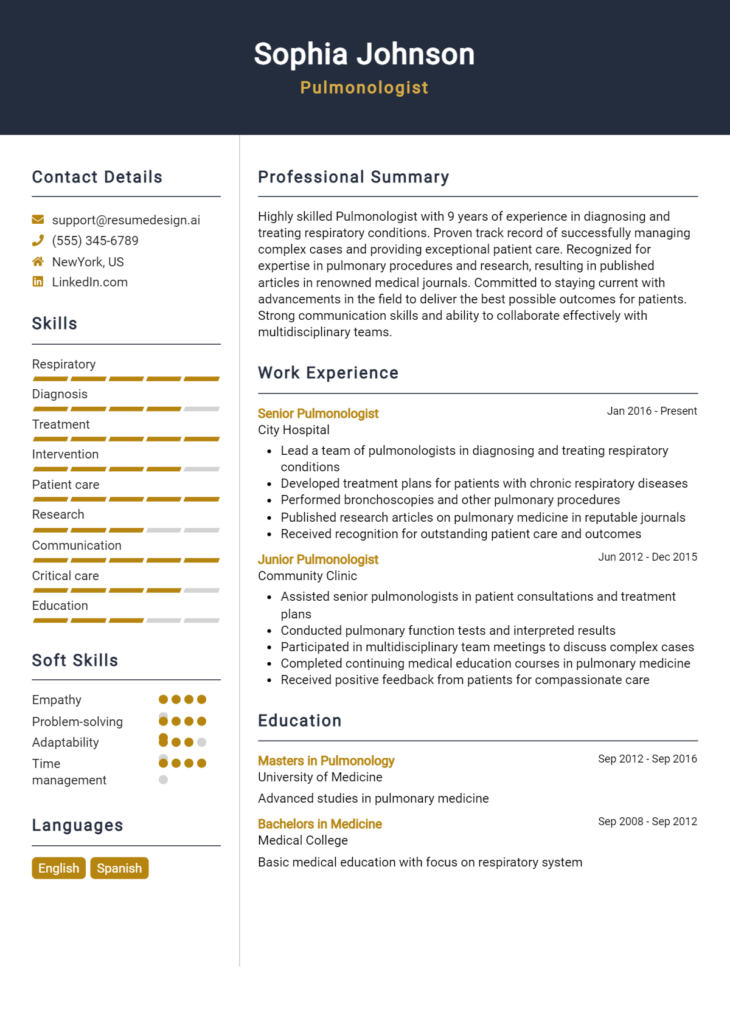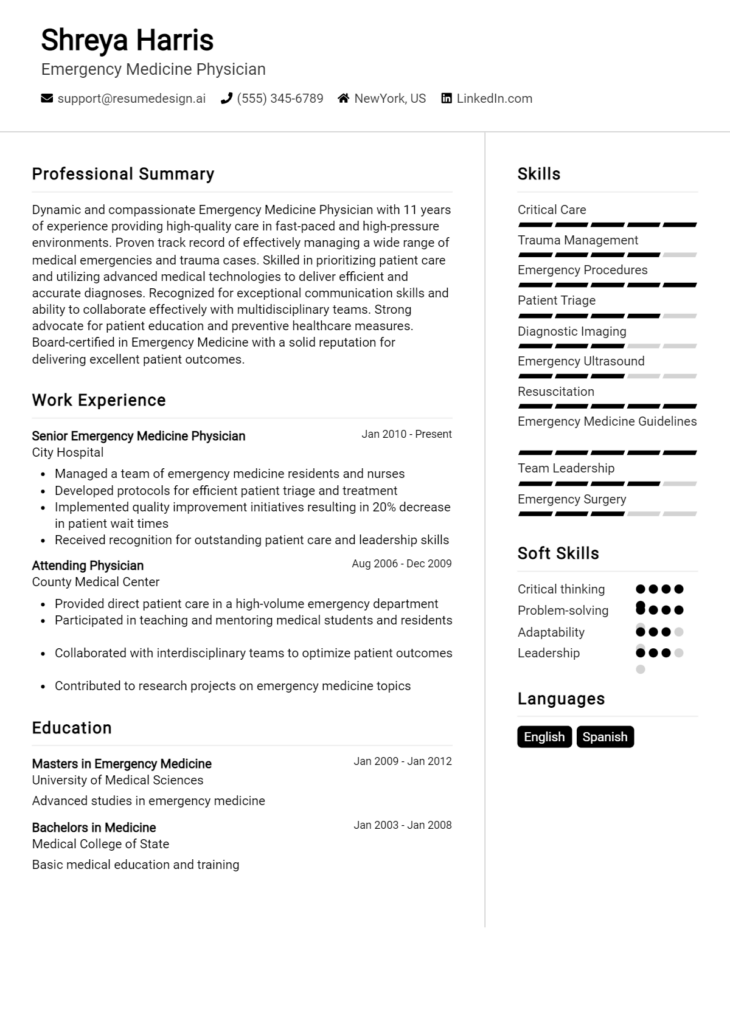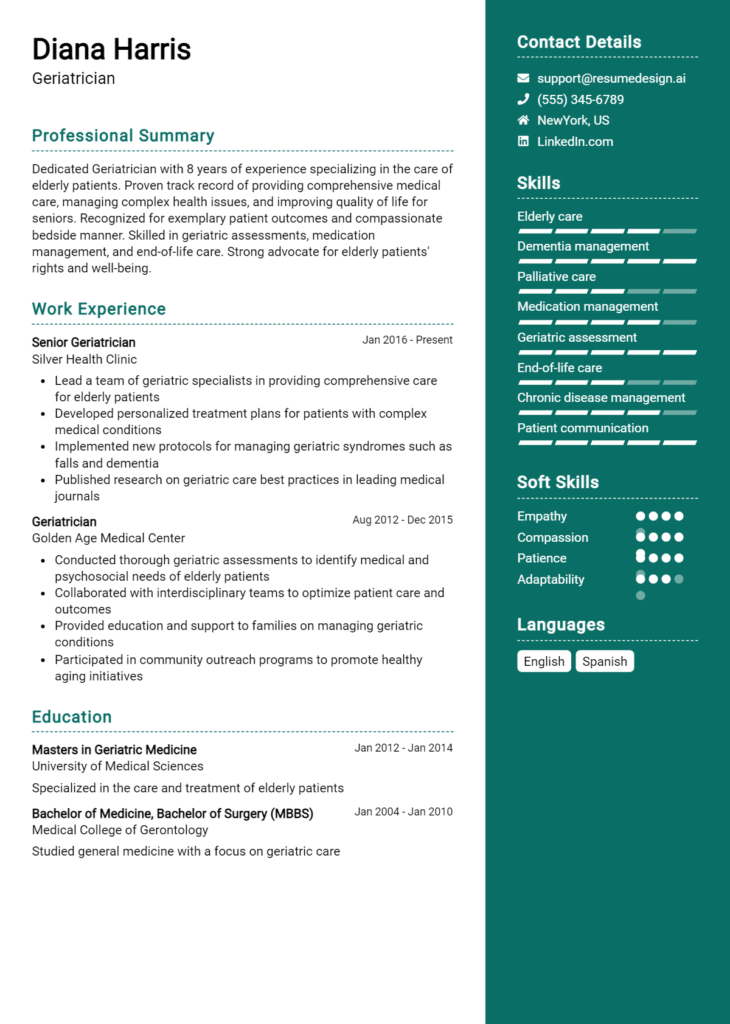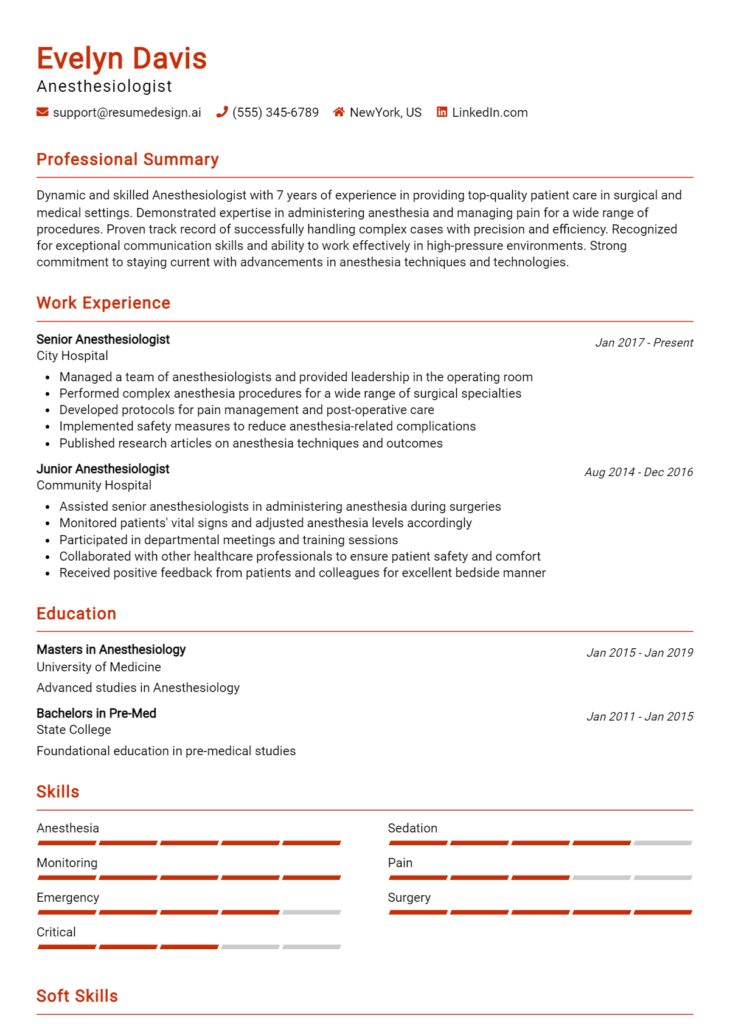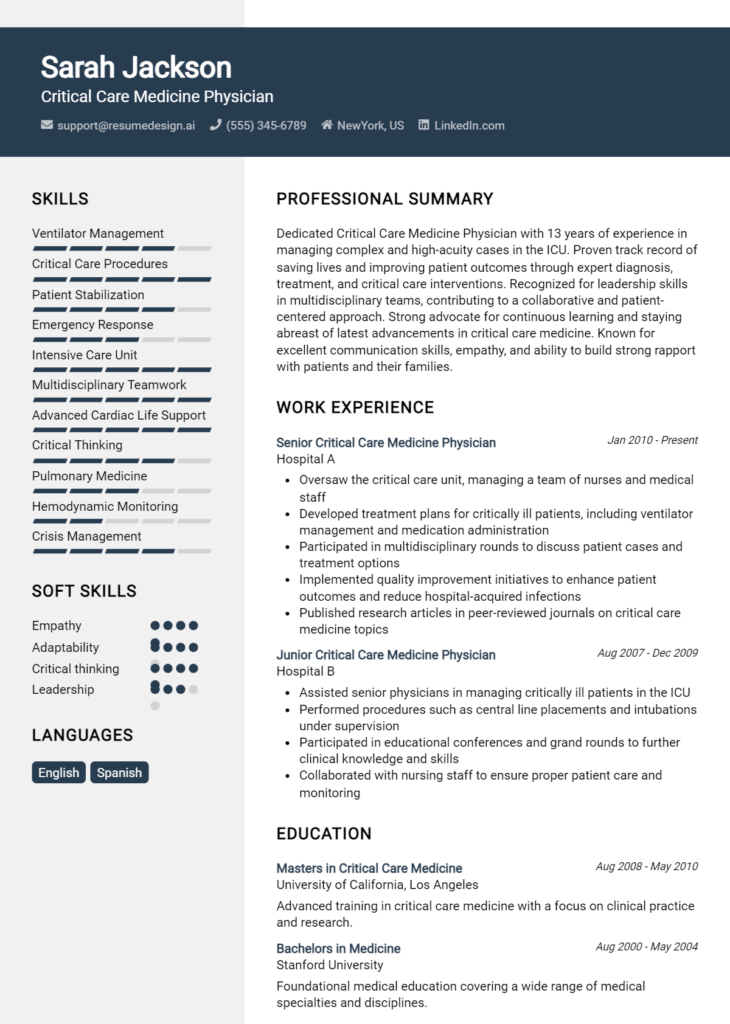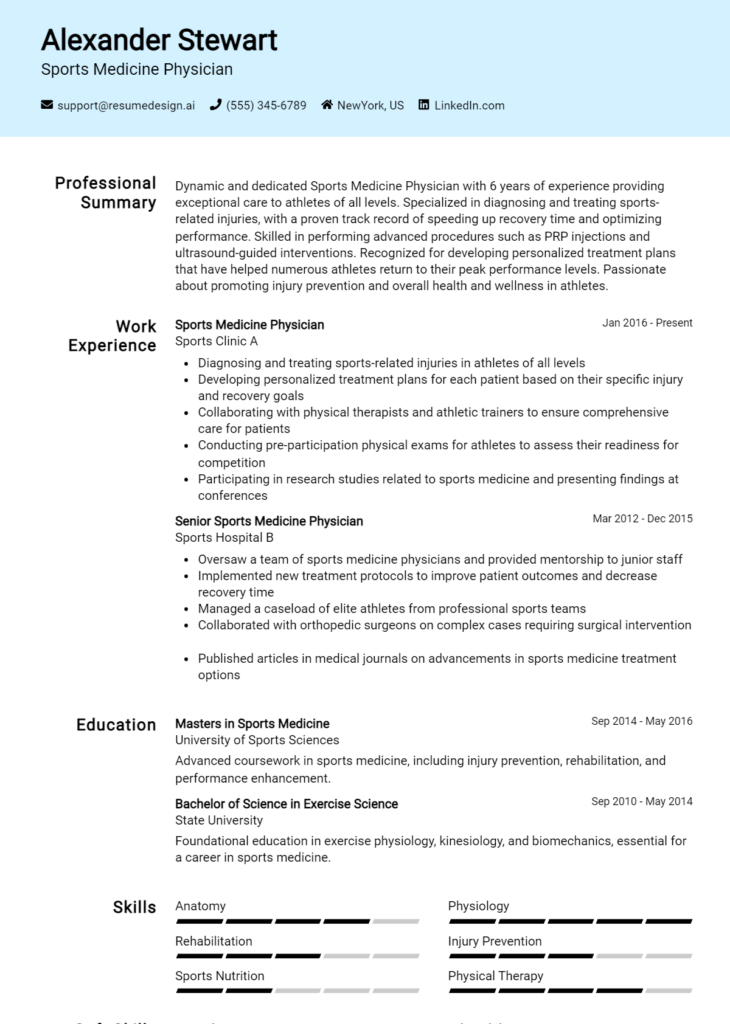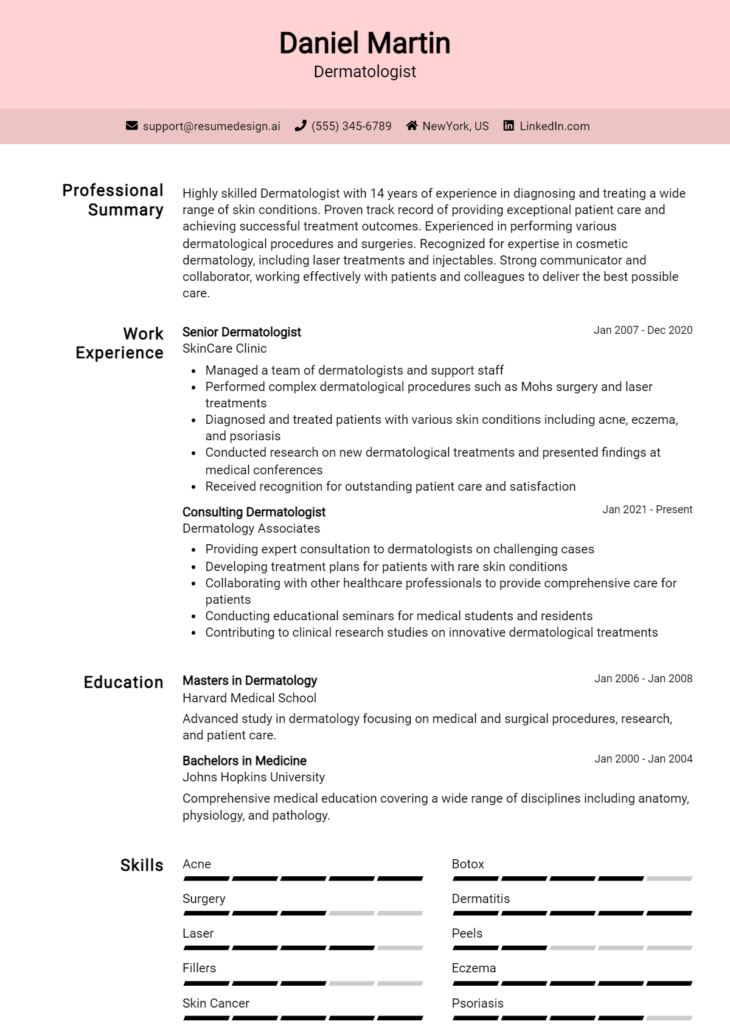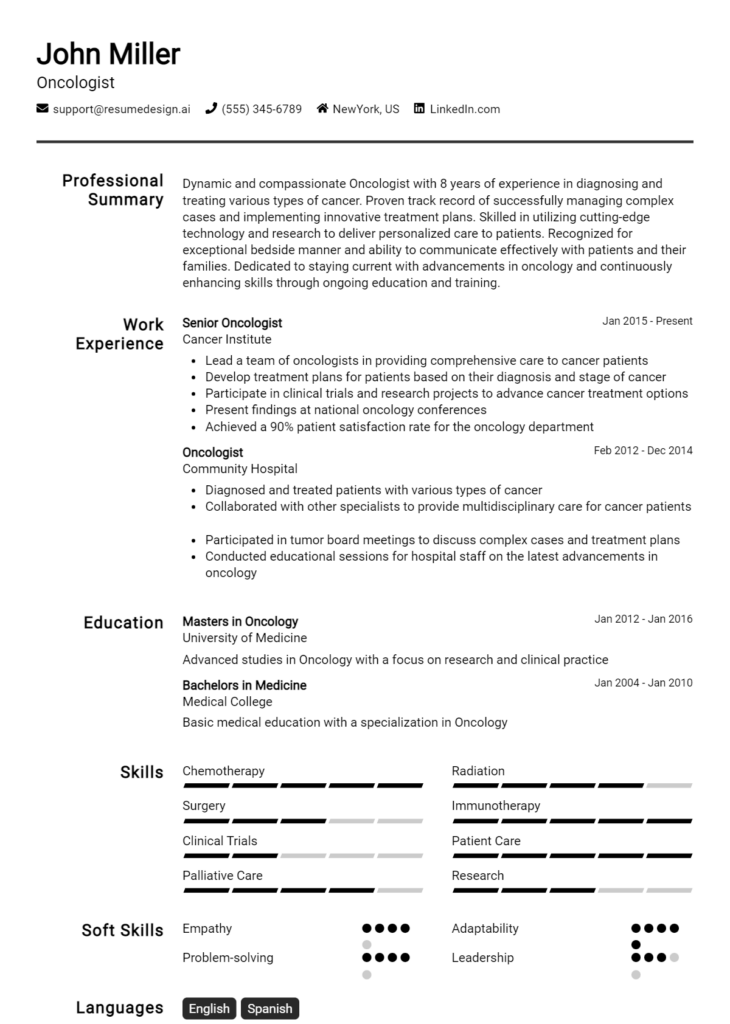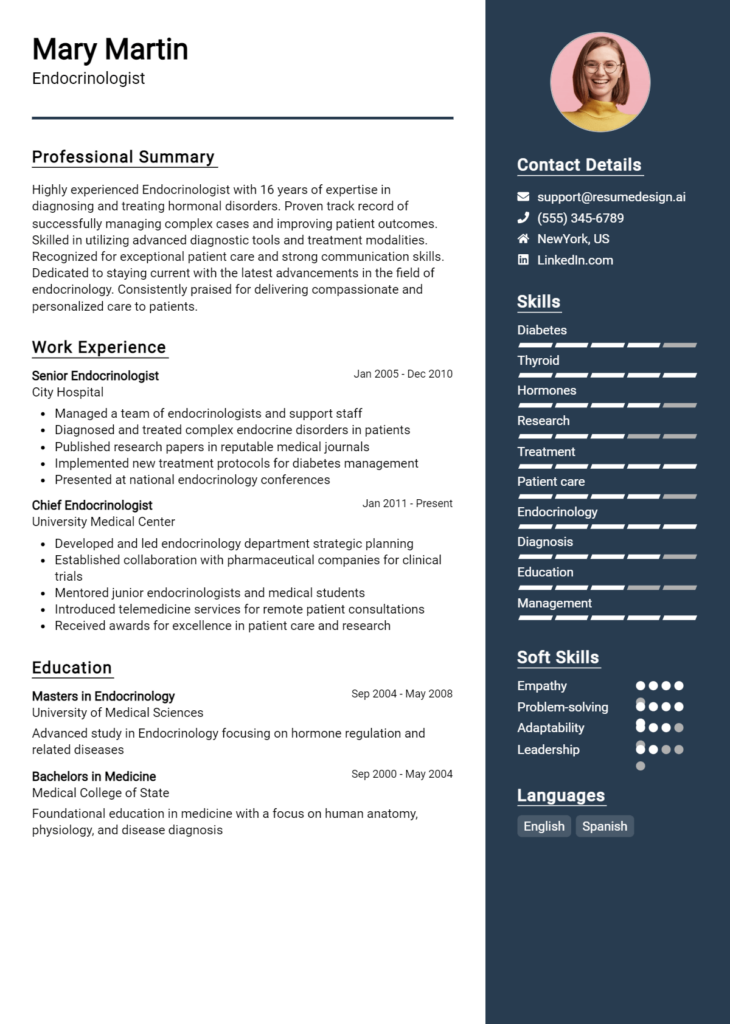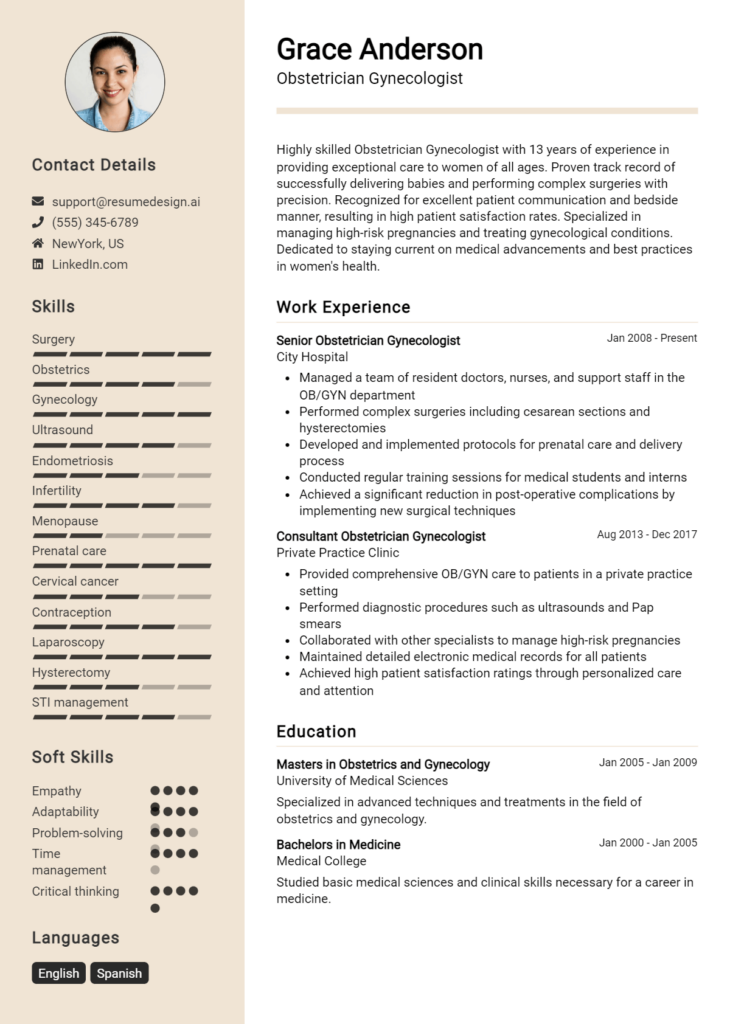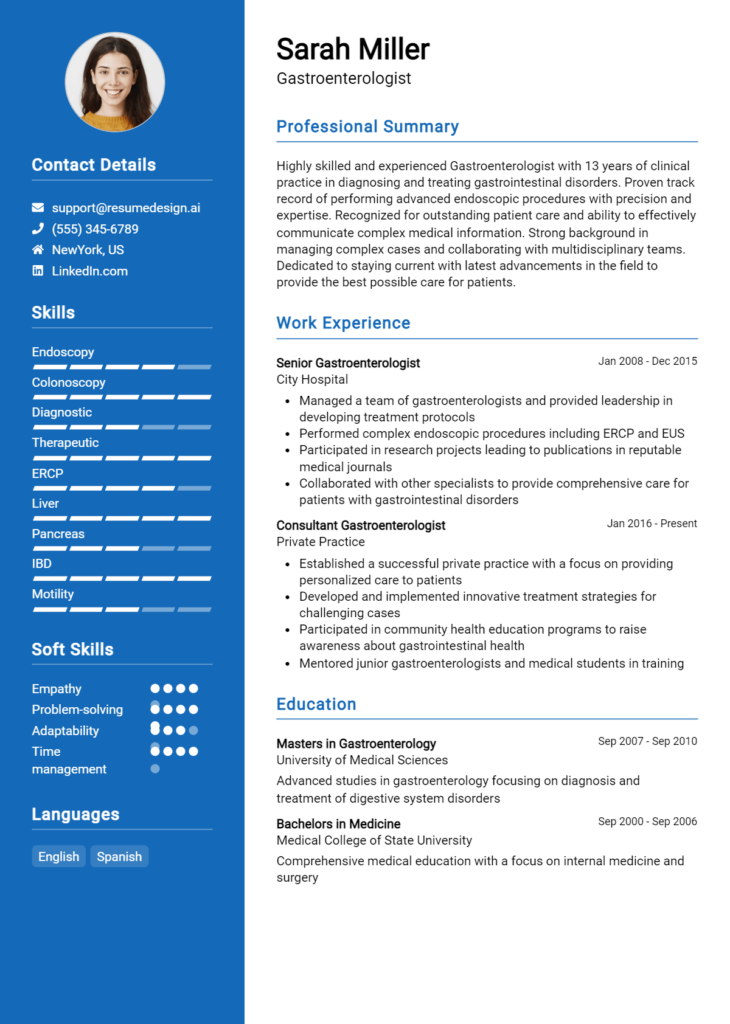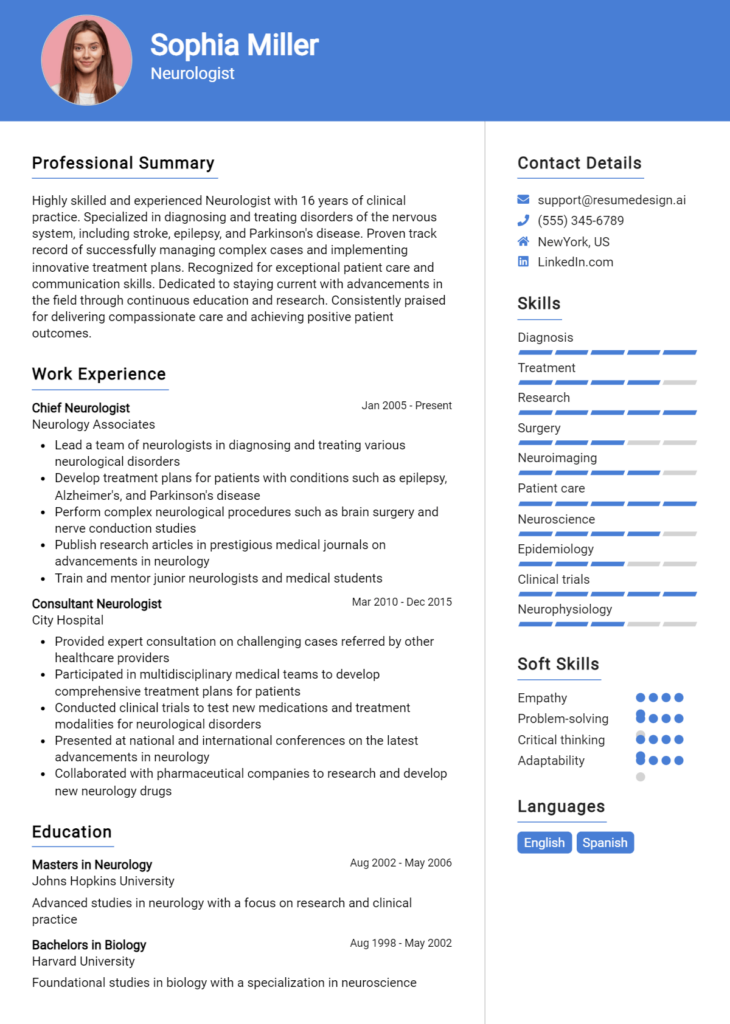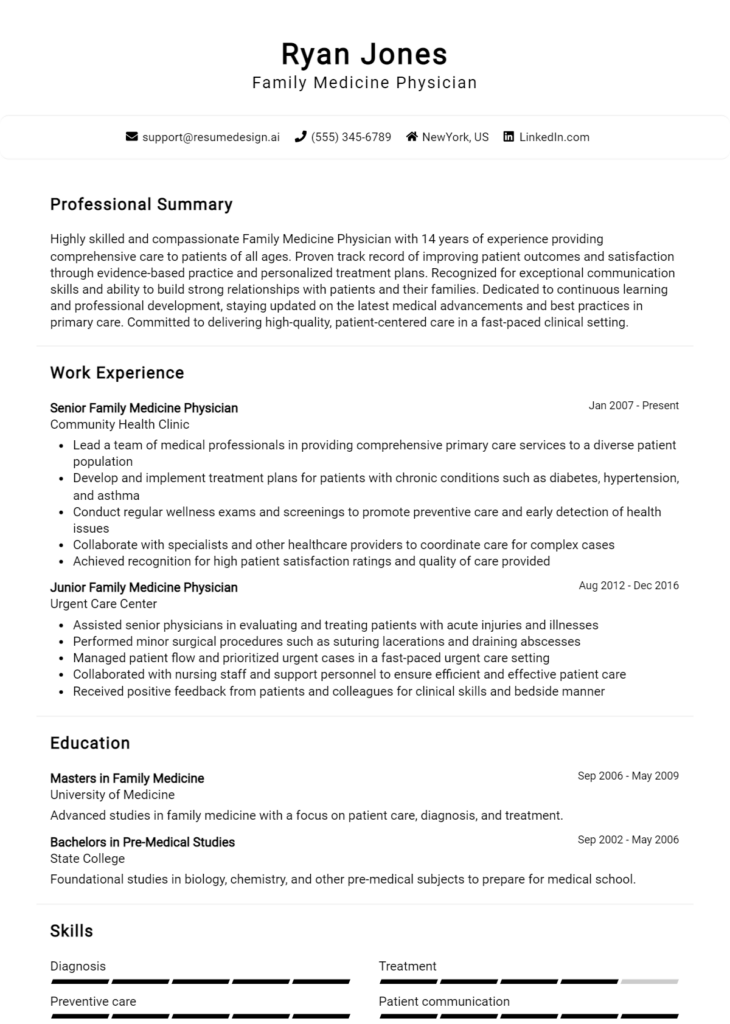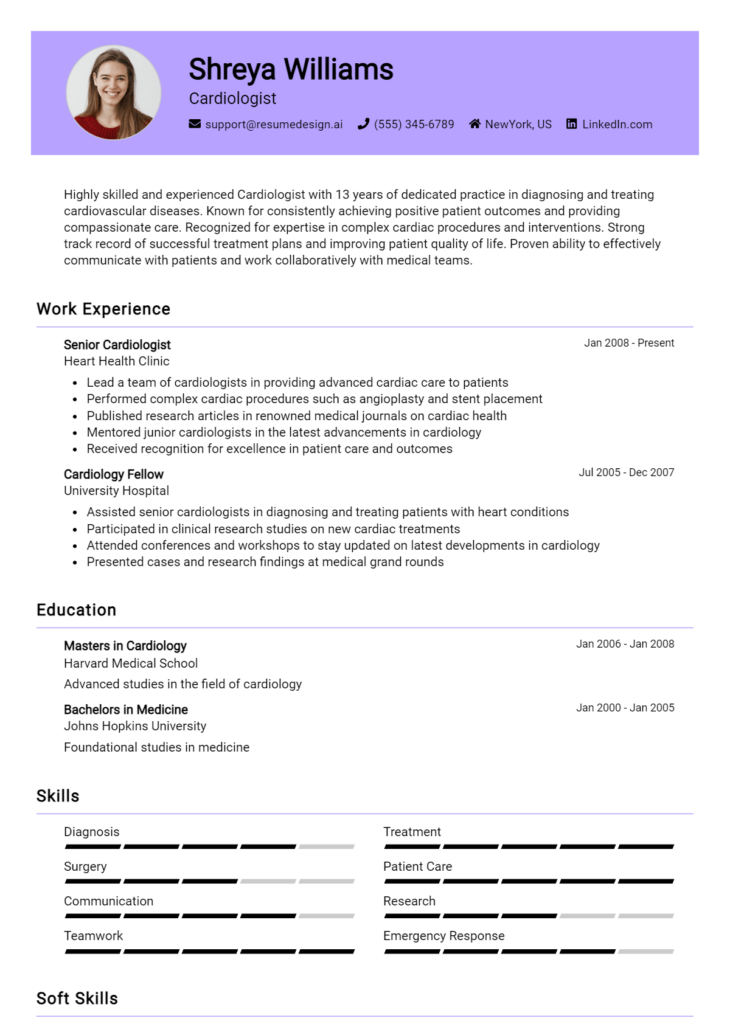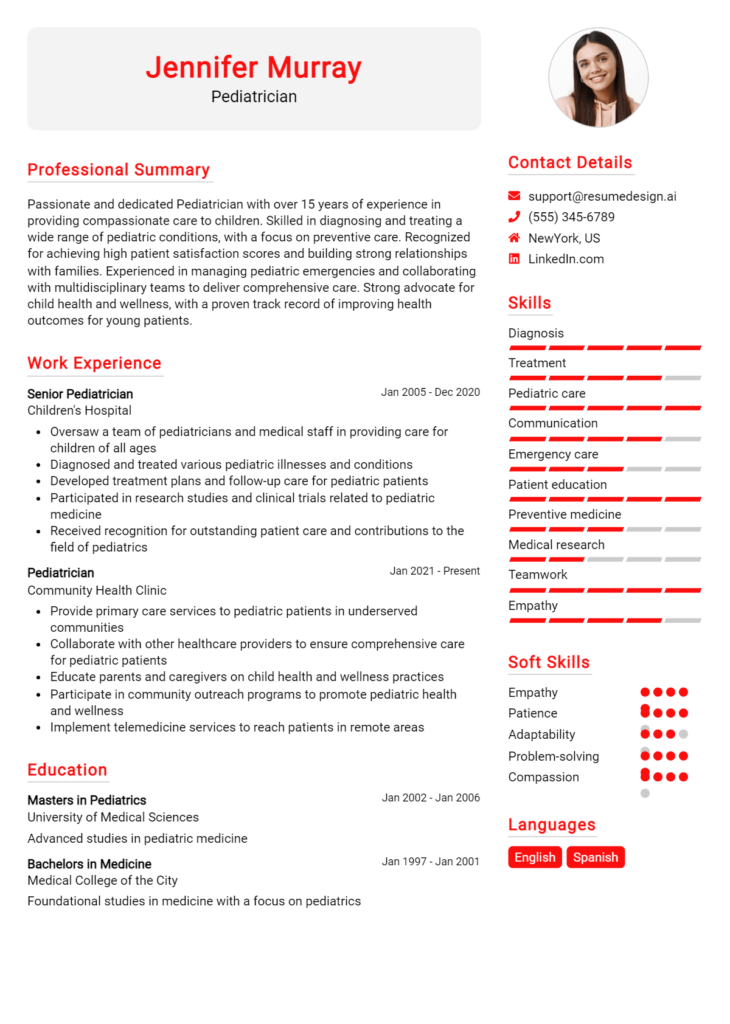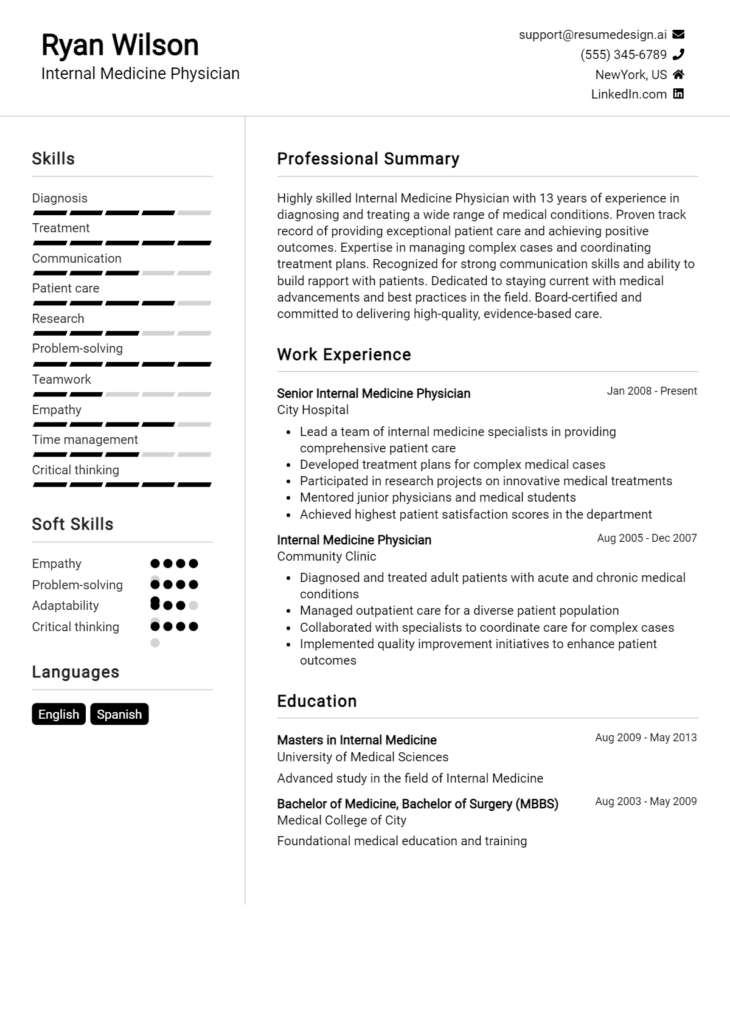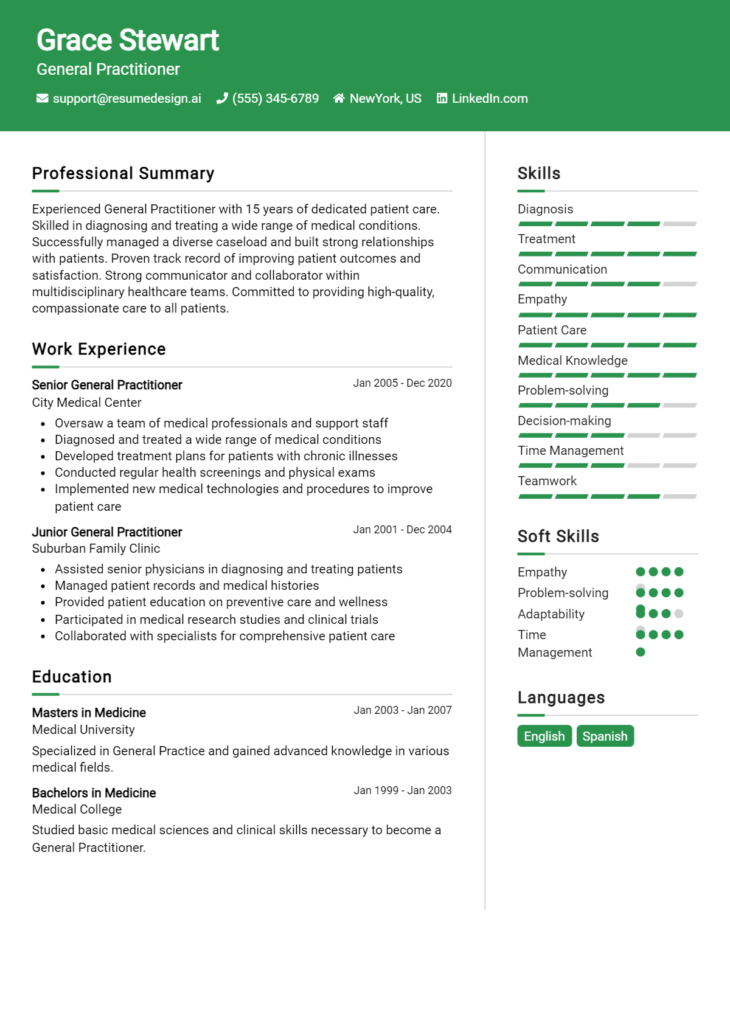Sleep Medicine Specialist Core Responsibilities
A Sleep Medicine Specialist plays a crucial role in diagnosing and treating sleep disorders, requiring a blend of technical, operational, and problem-solving skills. This position bridges various departments, collaborating with healthcare providers, researchers, and patients to formulate effective treatment plans. Essential skills include knowledge of sleep studies, the ability to interpret polysomnography, and excellent communication abilities. Showcasing these qualifications in a well-structured resume can significantly contribute to achieving the organization's overall health goals.
Common Responsibilities Listed on Sleep Medicine Specialist Resume
- Conduct comprehensive sleep evaluations and assessments.
- Interpret polysomnography and other sleep study results.
- Develop individualized treatment plans for patients.
- Monitor patient progress and adjust therapies as needed.
- Educate patients and families on sleep hygiene and disorders.
- Collaborate with multidisciplinary teams to enhance patient care.
- Stay updated on the latest research and advancements in sleep medicine.
- Participate in clinical trials and research studies.
- Document patient encounters and treatment outcomes accurately.
- Provide training and mentorship to junior staff and residents.
- Assist in the development of sleep disorder programs and protocols.
- Engage in community outreach and education initiatives on sleep health.
High-Level Resume Tips for Sleep Medicine Specialist Professionals
In the competitive field of sleep medicine, a well-crafted resume is crucial for professionals aiming to make a lasting impression on potential employers. Your resume serves as the first point of contact, often determining whether you move forward in the hiring process. It needs to effectively reflect your skills, achievements, and unique qualifications that set you apart from other candidates. In this guide, we will provide practical and actionable resume tips specifically tailored for Sleep Medicine Specialist professionals, ensuring that your resume not only stands out but also aligns with the expectations of hiring managers in this specialized field.
Top Resume Tips for Sleep Medicine Specialist Professionals
- Tailor your resume to the job description by incorporating relevant keywords and phrases that align with the specific requirements of the position.
- Highlight your clinical experience in sleep medicine, including any relevant fellowships, residencies, or specialized training.
- Showcase your accomplishments by quantifying your achievements, such as the number of patients managed or improvements in patient outcomes.
- Include certifications and licenses pertinent to sleep medicine, such as the American Board of Sleep Medicine certification.
- Emphasize your knowledge of sleep disorders and treatments, including familiarity with CPAP therapy, sleep studies, and behavioral interventions.
- List any research projects or publications related to sleep medicine to demonstrate your commitment to advancing the field.
- Incorporate soft skills relevant to patient care, such as empathy, communication, and teamwork, which are vital in a clinical setting.
- Utilize a clean, professional format that enhances readability and ensures that key information is easily accessible to reviewers.
- Include professional affiliations and memberships in organizations related to sleep medicine, which can reflect your dedication to ongoing education and networking in the field.
By implementing these tips, you can significantly increase your chances of landing a job in the Sleep Medicine Specialist field. A well-structured and tailored resume not only showcases your qualifications but also demonstrates your commitment to the profession, making you a compelling candidate in the eyes of potential employers.
Why Resume Headlines & Titles are Important for Sleep Medicine Specialist
In the competitive field of sleep medicine, a well-crafted resume headline or title plays a crucial role in making a strong first impression. It serves as an immediate identifier of a candidate's qualifications, succinctly summarizing their expertise and value to potential employers. A compelling headline can quickly catch the attention of hiring managers, providing them with a snapshot of what the candidate brings to the table. By being concise, relevant, and directly aligned with the position being applied for, a powerful resume headline sets the tone for the rest of the application and can significantly enhance the candidate's chances of being noticed.
Best Practices for Crafting Resume Headlines for Sleep Medicine Specialist
- Keep it concise: Aim for one impactful phrase that encapsulates your expertise.
- Be specific: Use terminology relevant to the sleep medicine field to demonstrate your knowledge.
- Highlight achievements: Incorporate notable accomplishments that showcase your skills.
- Use action verbs: Start with strong action words to convey your contributions effectively.
- Tailor to the job: Align your headline with the specific requirements of the position you're applying for.
- Showcase certifications: Mention relevant certifications or specialties to enhance credibility.
- Focus on impact: Emphasize how your skills can benefit the employer and their patients.
- Make it memorable: Use unique phrasing to stand out among other candidates.
Example Resume Headlines for Sleep Medicine Specialist
Strong Resume Headlines
Board-Certified Sleep Medicine Specialist with 10+ Years of Clinical Experience
Expert in Sleep Disorder Diagnosis and Treatment with Proven Patient Outcomes
Compassionate Sleep Medicine Physician Specializing in Pediatric Sleep Disorders
Innovative Sleep Medicine Specialist with a Focus on Research and Evidence-Based Practices
Weak Resume Headlines
Sleep Doctor Looking for Opportunities
Healthcare Professional
Experienced in Sleep Medicine
The strong headlines are effective because they clearly communicate the candidate’s qualifications, specific areas of expertise, and the value they can bring to an employer. They are tailored to the role and use impactful language that resonates with hiring managers. In contrast, the weak headlines lack specificity, fail to convey unique strengths, and do not capture the attention of potential employers, making them forgettable and less effective in a competitive job market.
Writing an Exceptional Sleep Medicine Specialist Resume Summary
A well-crafted resume summary is crucial for a Sleep Medicine Specialist as it serves as the first impression for hiring managers. This brief introduction provides a snapshot of the candidate's key skills, relevant experience, and notable accomplishments, allowing them to quickly gauge the candidate's suitability for the role. A strong resume summary should be concise yet impactful, tailored specifically to the job description, and designed to capture attention in a competitive job market. By highlighting the most pertinent details, candidates can effectively set themselves apart from others vying for the same position.
Best Practices for Writing a Sleep Medicine Specialist Resume Summary
- Quantify Achievements: Use specific numbers and metrics to demonstrate the impact of your work.
- Focus on Relevant Skills: Highlight skills that are directly applicable to sleep medicine and the job description.
- Tailor for the Job Description: Customize your summary to align with the specific requirements and preferences mentioned in the job posting.
- Keep It Concise: Aim for 3-5 sentences that convey your qualifications succinctly.
- Use Industry Keywords: Incorporate relevant terminology and keywords that resonate within the field of sleep medicine.
- Showcase Certifications and Training: Mention relevant certifications, training, or specialized education that bolster your candidacy.
- Highlight Soft Skills: Don’t forget to include essential interpersonal skills, such as communication and empathy, which are vital in patient care.
- Maintain a Professional Tone: Ensure that the language used is formal yet approachable, reflecting professionalism in the medical field.
Example Sleep Medicine Specialist Resume Summaries
Strong Resume Summaries
Dedicated Sleep Medicine Specialist with over 7 years of experience in diagnosing and treating sleep disorders. Successfully improved patient outcomes by 30% through comprehensive treatment plans and patient education initiatives.
Board-certified Sleep Medicine Specialist skilled in polysomnography and cognitive behavioral therapy for insomnia. Managed a caseload of over 150 patients annually, leading to a 95% satisfaction rate based on follow-up surveys.
Compassionate Sleep Medicine Specialist with expertise in pediatric sleep disorders. Developed and implemented a new protocol that reduced average wait times for sleep studies by 20%, significantly enhancing patient experience.
Weak Resume Summaries
Experienced doctor with knowledge in sleep medicine. I have worked in various settings and am good with patients.
Sleep Medicine Specialist looking for a new opportunity. I have a strong background in medicine and can help patients with sleep issues.
The examples of strong resume summaries are effective because they provide specific achievements, quantify results, and demonstrate a clear relevance to the role of a Sleep Medicine Specialist. They include measurable outcomes and relevant skills that directly address the expectations of potential employers. In contrast, the weak summaries lack specificity and fail to showcase any quantifiable successes, making them generic and unmemorable, which diminishes the candidate's appeal.
Work Experience Section for Sleep Medicine Specialist Resume
The work experience section of a Sleep Medicine Specialist resume is crucial as it provides a comprehensive overview of the candidate's professional journey and expertise in the field. This section not only highlights the technical skills acquired through years of practice but also reflects the candidate's ability to manage teams, engage in collaborative projects, and deliver high-quality patient care. Quantifying achievements—such as improvements in patient outcomes or enhancements in diagnostic processes—and aligning experiences with industry standards are essential to demonstrate the candidate's value and impact in the field of sleep medicine.
Best Practices for Sleep Medicine Specialist Work Experience
- Use clear, concise language to describe your roles and responsibilities.
- Quantify achievements with specific metrics, such as percentage improvements in patient sleep quality.
- Highlight technical skills relevant to sleep studies, polysomnography, and treatment protocols.
- Emphasize collaboration with multidisciplinary teams, including nurses, psychologists, and other specialists.
- Include leadership roles that demonstrate your ability to manage projects or supervise staff.
- Align experiences with current industry standards and best practices in sleep medicine.
- Showcase participation in research or educational initiatives that contribute to the field.
- Use action verbs to convey a sense of initiative and responsibility in your roles.
Example Work Experiences for Sleep Medicine Specialist
Strong Experiences
- Led a team of 10 healthcare professionals in a comprehensive sleep disorder clinic, achieving a 30% increase in patient satisfaction scores over two years.
- Implemented new polysomnography techniques that reduced average diagnostic wait times by 25%, significantly improving patient access to care.
- Coordinated a multi-disciplinary research project that resulted in a published study on the effects of sleep apnea treatment, contributing to evidence-based practices.
- Managed a quality improvement initiative that decreased the rate of misdiagnosis in sleep disorders by 15% through enhanced training and protocols.
Weak Experiences
- Worked in a sleep clinic and assisted with patient care tasks.
- Helped with some studies related to sleep medicine.
- Participated in team meetings about improving patient care.
- Performed general duties in a healthcare setting.
The examples presented are considered strong because they include specific, quantifiable outcomes and illustrate the candidate's technical leadership and collaborative efforts within the field of sleep medicine. In contrast, the weak experiences lack detail and measurable achievements, making it difficult to understand the candidate's contributions or impact, ultimately failing to demonstrate their expertise and value in the role.
Education and Certifications Section for Sleep Medicine Specialist Resume
The education and certifications section of a Sleep Medicine Specialist resume is crucial in establishing the candidate's qualifications and expertise in the field. This section not only showcases the individual's academic background but also emphasizes their commitment to professional development through industry-relevant certifications. By providing details on relevant coursework, specialized training, and recognized certifications, candidates can significantly enhance their credibility and demonstrate their alignment with the requirements of the role. A well-structured education and certifications section can effectively convey a candidate's readiness to contribute to the field of sleep medicine.
Best Practices for Sleep Medicine Specialist Education and Certifications
- List degrees in reverse chronological order, starting with the most recent.
- Include relevant certifications such as the American Board of Sleep Medicine (ABSM) certification.
- Highlight specialized training or fellowships in sleep medicine.
- Provide detailed descriptions of relevant coursework that pertains to sleep disorders and treatments.
- Incorporate continuous education efforts, such as workshops or seminars attended.
- Ensure that all listed credentials are current and up-to-date.
- Use clear and concise language to describe qualifications, avoiding jargon unless widely recognized.
- Tailor the education and certification section to reflect the specific requirements of the job being applied for.
Example Education and Certifications for Sleep Medicine Specialist
Strong Examples
- Doctor of Medicine (MD) - Harvard Medical School, Graduated 2015
- Board Certified in Sleep Medicine - American Board of Sleep Medicine, Certified 2018
- Fellowship in Sleep Medicine - Mayo Clinic, Completed 2016
- Relevant Coursework: Advanced Sleep Disorders, Sleep Physiology, and Treatment Modalities
Weak Examples
- Bachelor of Arts in Psychology - University of California, Graduated 2005
- Certification in General Practice - National Board of Medical Examiners, Certified 2010
- Workshop on Sleep Hygiene - Community Center, Completed 2012
- Online Course on Meditation - Various Platforms, Completed 2020
The strong examples are considered effective because they directly relate to the qualifications necessary for a Sleep Medicine Specialist, showcasing advanced degrees, certifications, and relevant specialized training. In contrast, the weak examples are less impactful as they either lack relevance to the specific field of sleep medicine or represent outdated or general qualifications that do not align with the expectations for the role. Focusing on specific and recognized credentials is essential to demonstrate a candidate's suitability and dedication to the field.
Top Skills & Keywords for Sleep Medicine Specialist Resume
In the competitive field of sleep medicine, a well-crafted resume is essential for showcasing your qualifications and expertise. The skills you highlight can significantly impact your chances of landing an interview and ultimately securing a position. A Sleep Medicine Specialist must possess a combination of both hard and soft skills to effectively diagnose and treat sleep disorders. These skills not only demonstrate your clinical competence but also your ability to communicate and empathize with patients. Including a comprehensive list of relevant skills in your resume can help you stand out among other candidates and illustrates your readiness to contribute to the field of sleep medicine.
Top Hard & Soft Skills for Sleep Medicine Specialist
Hard Skills
- Sleep study interpretation
- Polysomnography
- Continuous positive airway pressure (CPAP) therapy
- Sleep disorder diagnosis
- Knowledge of pharmacology related to sleep medicine
- Behavioral sleep medicine techniques
- Sleep hygiene education
- Pediatric sleep medicine
- Use of actigraphy devices
- Understanding of circadian rhythms
- Data analysis and reporting
- Knowledge of sleep-related breathing disorders
- Familiarity with sleep medicine guidelines and protocols
- Experience with sleep disorder treatment plans
- Proficiency in electronic health records (EHR) systems
- Understanding of insomnia management techniques
- Knowledge of insomnia and hypersomnolence disorders
Soft Skills
- Strong communication skills
- Empathy and patient-centered care
- Problem-solving abilities
- Attention to detail
- Time management
- Team collaboration
- Critical thinking
- Adaptability
- Active listening
- Conflict resolution
- Cultural competence
- Professionalism
- Compassionate patient interaction
- Ability to work under pressure
- Strong organizational skills
- Mentoring and training abilities
- Ethical decision-making
- Patient advocacy
For more guidance on the essential skills and work experience required for a Sleep Medicine Specialist, consider exploring additional resources that can enhance your resume and professional profile.
Stand Out with a Winning Sleep Medicine Specialist Cover Letter
Dear Hiring Manager,
I am writing to express my interest in the Sleep Medicine Specialist position at [Company Name], as advertised on [where you found the job listing]. With a robust background in internal medicine and specialized training in sleep disorders, I am excited about the opportunity to contribute my expertise in diagnosing and treating patients suffering from a wide range of sleep-related issues. My commitment to patient-centered care, combined with my experience in conducting polysomnography and managing complex cases, positions me as a strong candidate for this role.
In my previous position at [Previous Employer], I successfully developed and implemented comprehensive treatment plans for patients with conditions such as sleep apnea, insomnia, and restless leg syndrome. I collaborated closely with multidisciplinary teams to ensure integrated care, leveraging my skills in both clinical and behavioral approaches to improve patient outcomes. I have also been involved in research initiatives that aimed to enhance sleep health awareness in the community, further underscoring my dedication to advancing the field of sleep medicine.
I am particularly impressed by [Company Name]'s commitment to innovation in sleep health and its approach to integrating technology into patient care. I believe that my background in utilizing telemedicine to reach underserved populations aligns well with your mission of improving access to quality sleep care services. I am eager to bring my clinical expertise, patient advocacy skills, and passion for education to your esteemed team.
Thank you for considering my application. I look forward to the opportunity to discuss how my qualifications align with the goals of [Company Name] and how I can contribute to enhancing the sleep health of our community. Please feel free to contact me at your earliest convenience to schedule a conversation.
Sincerely,
[Your Name]
[Your Contact Information]
[Your LinkedIn Profile]
Common Mistakes to Avoid in a Sleep Medicine Specialist Resume
Crafting a resume as a Sleep Medicine Specialist requires careful consideration to effectively showcase your qualifications and expertise in this specialized field. Unfortunately, many candidates make common mistakes that can diminish their chances of standing out to potential employers. By avoiding these pitfalls, you can create a compelling resume that highlights your strengths and experiences relevant to sleep medicine.
Neglecting Relevant Keywords: Failing to include specific terminology related to sleep medicine can result in your resume being overlooked by Applicant Tracking Systems (ATS) or hiring managers. Make sure to incorporate keywords from the job description.
Overloading with Jargon: While it’s important to demonstrate expertise, using excessive medical jargon can alienate non-specialist readers. Aim for clarity and ensure your resume is understandable to a broader audience.
Lack of Quantifiable Achievements: Simply listing duties without providing measurable outcomes can weaken your resume. Include specific achievements, such as the number of patients treated or improvements in sleep study results.
Ignoring the Format: A cluttered or unprofessional format can distract from your qualifications. Use a clean, organized layout with clear headings and bullet points to enhance readability.
Generic Objective Statements: A vague or generic objective statement does little to capture attention. Tailor your objective to reflect your passion for sleep medicine and your career goals specific to each position.
Omitting Continuing Education and Certifications: Sleep medicine is an evolving field, and failing to list relevant certifications or continuing education can suggest a lack of commitment to professional development. Include any certifications, fellowships, or training specific to sleep disorders.
Listing Irrelevant Experience: Including unrelated work experiences can dilute the focus of your resume. Highlight only those roles and responsibilities that relate directly to sleep medicine or demonstrate transferable skills.
Not Proofreading: Spelling and grammatical errors can create an impression of carelessness. Always proofread your resume multiple times or have someone else review it to ensure it is polished and professional.
Conclusion
As a Sleep Medicine Specialist, you play a critical role in diagnosing and treating sleep disorders, which can significantly impact the overall health and well-being of your patients. Your expertise not only involves interpreting sleep studies but also developing comprehensive treatment plans that encompass both medical and lifestyle interventions. The demand for Sleep Medicine Specialists continues to grow as awareness of sleep health rises, making it essential to present your qualifications effectively.
In crafting your resume, it's important to highlight relevant education, certifications, and clinical experience. Emphasize your skills in patient management, knowledge of the latest sleep technology, and your ability to work collaboratively in a healthcare setting. Tailoring your resume to showcase your specific contributions and accomplishments in the field will make you stand out to potential employers.
To ensure your resume reflects your qualifications and aligns with industry standards, consider reviewing it for clarity, conciseness, and impact. Utilize available resources to enhance your application materials. Explore resume templates to find a design that suits your professional style. If you're looking for a more personalized approach, try the resume builder to create a tailored resume that highlights your unique strengths. Additionally, you can look at resume examples to get inspiration and understand what successful candidates have included in their applications. Don’t forget to complement your resume with a compelling cover letter template that can help introduce you effectively to hiring managers.
Take action today by reviewing your Sleep Medicine Specialist resume and utilizing these tools to improve your chances of landing your next opportunity in this vital and growing field.

